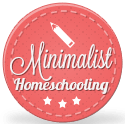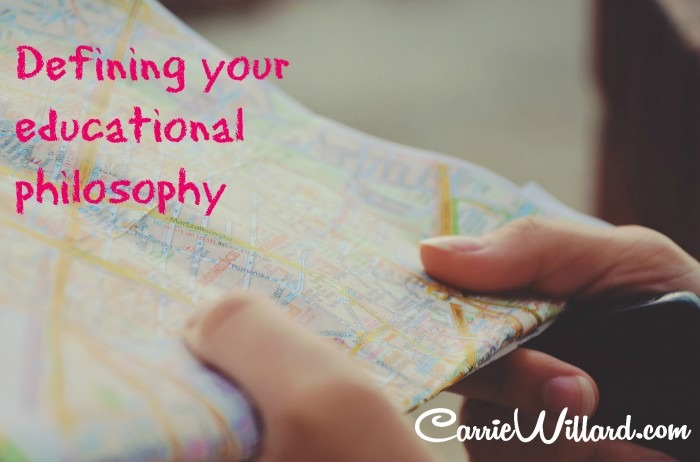This is a post in a series of 31 Days of Minimalist Homeschooling. See the intro post with all the topics here.
Defining your educational philosophy
Now that you’ve spent some time thinking about what education means to you, now it’s time to define your particular homeschooling and educational philosophy. It’s worth spending some time on this and even writing some things down before you begin homeschooling.
What does a well-educated person look like? What are your overarching goals for your child? How do you think you can best meet those goals with your children?
A homeschooling philosophy will be like a lighthouse that guides you when things are tough. It will also help you avoid pitfalls and constantly second-guessing yourself. Revisit this philosophy when you feel stressed. It will minimize those freak outs you will have periodically about your child’s education. While I won’t take the time to do a full discussion of all the homeschool philosophies, here are the big ones. Check out the book recommendations below for more information.
* Unschooling
* Classical
* Traditional
* Eclectic
* Unit Study
* Charlotte Mason
* Thomas Jefferson/Leadership education
* Waldorf
I’m not providing links because I can’t vouch for them as the one defining site for that approach. A Google search will turn up the best. There are legions of websites that can guide you in this process, and it’s easy to get overwhelmed in debates – everyone thinks their way is best. Personally I think reading an unbiased overview of the various philosophies in a better approach.
Defining your homeschooling philosophy before purchasing curriculum is extremely important. If you buy curriculum that doesn’t mesh with your beliefs about education, you’ll find yourself frustrated and likely your child will be unhappy too. You’ll waste time and money.
Of course, as you continue in your homeschooling journey, you may find that your belief systems change. One of the beautiful things about homeschooling is that you can change things on a dime without having to jump through hoops or get anyone else’s approval.
Recommended Resources:
100 Top Picks For Homeschool Curriculum: Choosing The Right Curriculum And Approach For Your Child’s Learning Style – this is an excellent book that lives on my shelves. Author Cathy Duffy is well-known in the homeschooling world as an expert. Her website with reviews is a wonderful resource. She does a great job in this book of giving you a general overview of the various homeschooling philosophies, help you choose the style (or a mash-up of more than one!) that will work for you and your kids, and how many sources of curricula available for purchase match up with those. Most large libraries will have this book available.
The Unschooling Handbook : How to Use the Whole World As Your Child’s Classroom by Mary Griffiths
Unschooling, or child directed learning, is practiced by an estimated 10 – 15% of American parents. This book teaches you how to use the “whole world as your child’s curriculum” and is a breath of fresh air to parents who trust their children to learn naturally with minimal outside interference.
Life Learning: Lessons from the Educational Frontier is a wonderful book for parents who need to learn to trust themselves with their children’s education. Reading the stories of kids who were home educated and the fascinating choices they were making as young adults, was like catnip for me. Life Learning is a series of essays compiled by Wendy Priesnitz of Natural Life magazine.


In my 19 years that I homeschooled, I think I tried every method! I finally settled on eclectic with CM and Classical leanings. Looks like you will be writing about some neat things.
I love the sound of Charlotte Mason so far!